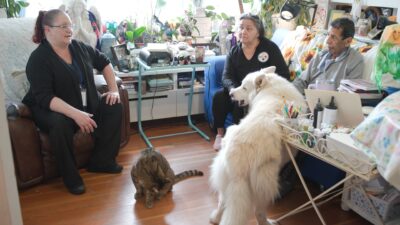“How do I tell my child?” This question frequently comes up whenever children face a death—whether it is the death of a parent, grandparent, other relative, or friend. Recent research has a reassuring message that reaffirms that children can be resilient, even in the face of loss. However, there are specific things that parents can do to enhance resilience.
First, model grief to your child. Tell the child what the loss meant to you and the ways that you are coping with the loss. Share what you are experiencing and what you are doing with your grief. Marge does that. In moments when memories overwhelm her, she tells her children, “I was just thinking about the time that Dad took us on that vacation.” Her children know it is safe to share their tears and their laughter.
If you are not functioning as well as you would like to, do what you can to help yourself. Remember the sound advice of airlines—take care of yourself before you take care of others. Avail yourself of the resources you might need, whether counseling or self-help groups. In this difficult time do not be afraid to ask your own support system, friends and family, to lend a hand. Grieving children benefit from knowing that they can count on the support of and from a network of adults.
The key here is sharing grief. This means accepting your children’s expressions of grief as well.
Yet, in that sharing it is still important to remember you are the parent or guardian. Your children always need to know you are taking care of them and protecting them—you are and remain in charge. Children need role models now more than ever. While you may share your feelings and reactions, it is important not to overwhelm children with your fears.
Children need information and reassurance as well. Their questions should be answered in honest and reassuring ways appropriate to their age. They may even need reassurance that they did not cause the death. Children also need to know that they are safe and they will be cared for by adults they trust. For Tommy, the sudden death of his mom made him anxious that something might happen to his dad. Tommy’s dad seriously addressed his concern, reassuring him both that the condition that affected Tommy’s mother would be unlikely to reoccur, and by reminding Tommy that should anything happen to his father, Tommy’s Aunt Lisa and Uncle Tony would take care of him.
Children also need consistency. Try as much as possible to keep consistent routines and discipline. The loss of someone close to the child can be a significant and critical change. The fewer changes a child experiences, the less stress they encounter and the more reassured the child will feel. When changes are inevitable, involve the child in a meaningful way.
Children thrive on the warmth and unconditional love of their parent or parents whether coping with loss or coping with life.
By Kenneth J. Doka, PhD, MDiv, Sr. Vice President, Grief Programs, HFA and recipient of the 2019 Lifetime Achievement Award from the Association for Death Education and Counseling.


